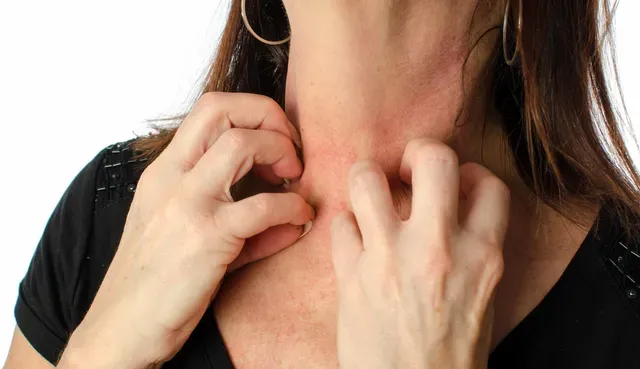Eczema (Atopic Dermatitis)
What is eczema?
Atopic dermatitis, also known as eczema, is an inflammatory skin condition that causes an itchy, red, dry rash. One in ten people will develop eczema during their lifetime, with roughly 31 million Americans living with eczema.
Eczema is a chronic condition without a cure, but with the right treatment plan and persistence it can be very well controlled. Children are more likely to be diagnosed with eczema, but it can start and be treated at any age.
What are eczema symptoms?
The most common symptom of eczema is itchy skin. Treatment of eczema is focused on breaking the itch-scratch cycle. This not only provides comfort, but also allows the skin to heal and repair itself. Other symptoms of eczema are:
- Dry skin
- Red, flaky rash
- Bumps or raised rash on the skin
- Scaly, leathery patches of skin
- Crusting/weeping/yellow drainage due to infection
Eczema can be found anywhere on the body, but some areas are more common than others such as inside the elbows and behind the knees. It can also be found on the neck, wrists, ankles, cheeks, hands, around the eyes, and buttocks.
What causes eczema?
Genetics are a big factor that contributes to eczema. If you have a parent with a history of allergies, asthma, or eczema you are more likely to have eczema. Some genes can lead to skin barrier defects, which can decrease the ability of the skin to retain water and increase the ability of allergens, fungi, chemicals, viruses, and bacteria to enter the body and increase the risk of allergies.
Food allergies can cause eczema to flare up. This is more common for infants and children. The most common foods to flare eczema are dairy, egg, peanut, wheat, tree nuts, soy, and seafood. If foods are causing an eczema flare up, discuss treatment with an allergist first before eliminating foods from the diet. It is often better to eat the food and treat the eczema as it will help lower the risk for anaphylaxis to that food in the future. Skin testing can be done to identify food allergies.
Environmental allergies such as pets, dust mites, molds, and pollen from grasses, trees, and weeds are known triggers for eczema. Skin testing for environmental allergies can help identify allergic triggers, making them easier to avoid and allergy shots (immunotherapy) can be started to help change the immune system to tolerate these allergens.
Chemical allergies and irritants the skin is exposed to every day can flare eczema. The most common are those in makeup, metal jewelry, detergents, soaps, lotions, disinfectants, certain clothing, fragrances, and rubber. A chemical patch test can be done to identify which products and chemicals could flare eczema in order to avoid them.
Low humidity and cold winters in Iowa can lead to eczema flares. Using moisturizing lotions and a humidifier set at 40-50% humidity can help keep skin from drying out.
Stress can cause eczema to flare. The reasoning behind this is not well understood but controlling the inflammatory stress response can help reduce eczema flares.
Are there any other conditions associated with eczema?
Eczema is considered the first allergic condition in a pattern called the atopic march. This is because the skin is the body’s first line of defense and when this barrier is broken by eczema, the body is exposed to viruses, bacteria, fungi, and allergens. The atopic march is a sequential development of other allergies that usually progresses in the same order for most people. Food allergies will follow the development of eczema because food is one of the first things infants encounter. Studies show children with severe eczema are the most likely to develop food allergies. Next is the development of environmental allergies (allergic rhinitis or hay fever). As people with eczema are exposed to the different seasons, they can develop allergies to mold or pollen from grasses, trees, and weeds along with pets and dust mites. The final step in the march is usually asthma since environmental allergies are the biggest trigger of asthma. There is also a hypothesis that there is another step in the march of a condition called eosinophilic esophagitis, which is the inflammation of the esophagus making it difficult to swallow. There is evidence that if eczema is well controlled when it first appears there is less chance of these other conditions developing.
What are the treatment options for eczema?
There are numerous treatment options for eczema including home interventions such as avoiding allergens, aggressive moisturizing, wet wraps, and much more. Prescription medications and creams are also used in the treatment of eczema along with allergy shots. Treatment plans vary based on the severity of the eczema as well as testing results for eczema triggers. We create individualized plans to help each patient manage their eczema.
What prescription options are available for eczema?
Topical steroids are the first line prescription treatment option for eczema. They have a varying range of strengths and potency and are very good at reducing itch and inflammation. If used for a long period of time it can cause side effects such as thinning of the skin.
Allergy shots can help control eczema. They are not medications but contain a person’s allergic triggers and train the body over time to accept the allergens.
Antihistamines can help relieve itching and scratching and can help skin to heal. They can also be used to help the patient sleep through the night and get better rest.
Nonsteroidal topical prescriptions such as calcineurin inhibitors, JAK inhibitors, and PDE4 inhibitors. They work well at reducing inflammation through various pathways in the immune system and do not have the skin thinning effects of topical steroids but do come with other side effects.
Biologics are newer injectable medications that target specific components of the immune system to reduce inflammation and help control eczema. These injectable medications are done every few weeks.
Phototherapy and immune modulating medications can be used for those not responding to the other treatments listed above.
How is eczema diagnosed?
Eczema is diagnosed by physical exam and medical history. There are no lab tests needed to make the diagnosis. We can do food testing, environmental allergy testing, and chemical patch testing to help identify triggers that cause eczema to flare up.
Call now to learn more about the best eczema treatment options for you.

